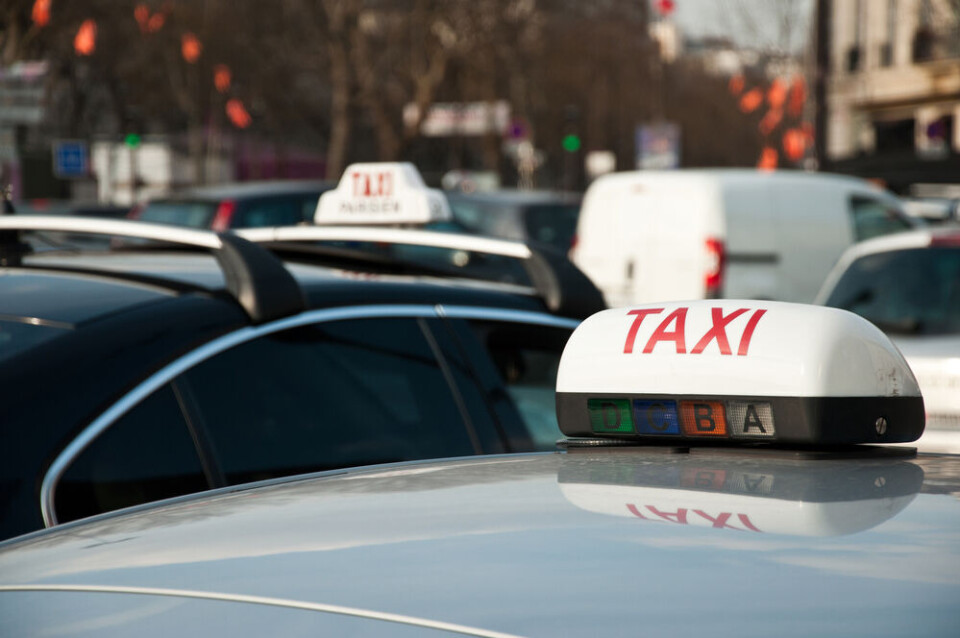-
Funeral held in Normandy for last Native American soldier to survive D-Day landings
Charles Norman Shay was among first to land on Omaha beach and a recipient of Silver Star and Legion of Honour medals
-
Visual: how healthy do French people think they are?
Progress in smoking rates but more than one in five people polled say they feel they drink excessively
-
Lost cat reunited with French family after 11 years thanks to identification tattoo
Shelter discovered injured elderly cat had identification tattoo which helped to track down previous owners
Taxis on ‘drive slow’ protest in France over hospital transport change
Drivers claim the new rule will lead to a ‘two-tier’ system, harm patients and threaten taxi drivers’ income

Taxis across France are on strike today (Monday, December 11) in protest against a new law that will require patients to share hospital transport in order to receive full reimbursement.
Drivers have come out against the law, which appears as article 30 in the new social security 2024 budget. It states that if a patient is well enough to share a taxi or hospital transport vehicle with another patient but they refuse to do so, then they will not receive as much medical reimbursement.
From 06:30 today, drivers mounted an ‘opération escargot (snail operation)’, meaning that they drove extremely slowly on major roads, to deliberately block them and stop other drivers from circulating. They did not pick up passengers.
Operations happened in Lille (Hauts-de-France), Avignon (Vaucluse), Toulouse (Haute-Garonne), Nice (Alpes-Maritimes) and Bayonne (Pyrénées-Atlantiques).
Les taxis de #Toulouse et de Haute-Garonne en colère contre une réforme du transport médicalisé. Beaucoup de taxis déjà à l'entrée de l'aéroport de Blagnac. Départ en opération escargot sur le #ToulousePeriph prévu à 7h30. Direction la #CPAM par les Ponts Jumeaux. #taxis pic.twitter.com/oXh2MnS8Bp
— La Dépêche 31 (@ladepeche31) December 11, 2023
Dans le cadre de la manifestation nationale des chauffeurs de taxis, l’opération escargot s’élance sur le boulevard du Maréchal Soult à Bayonne pic.twitter.com/MykvVm9zrP
— SO_Paysbasque (@SO_Paysbasque) December 11, 2023
What does the new rule say?
The budget de la Sécurité sociale, often shortened to the ‘Sécu’ budget, was adopted after the Assemblée nationale rejected a motion of no confidence against the government following Prime Minister Elisabeth Borne’s use again of the controversial article 49.3 to pass the bill.
Read more: What is France’s article 49.3?
It states that patients who refuse to share a health transport service (light medical vehicle or approved taxi) with another patient without a valid medical reason will have to pay in advance.
They will also only be reimbursed on the basis of the price of shared transport, rather than a solo service. So for a taxi that can technically take three people, this means that if a patient wants to travel solo, they will only be reimbursed 33% of the journey. For a two-person taxi, this would rise to 50%.
The government says that requiring patients to share whenever possible could save tens of millions of euros, and that vehicle sharing in 2022 saved €34 million.
‘A two-tier system’
But taxi drivers say that this rule will harm patients, cause them to wait longer, and take long detours, in a possibly less-comfortable vehicle. The new rule could also seriously harm some drivers’ income.
Vice-president of the Béarn Pays Basque Taxi Association, Baptiste Ondarts, explained: “Before, we essentially transported patients individually.
“From now on…the transport will no longer be patient-centred, but will be required to be in a medical bus for their appointments, with longer waiting times before and after, and detours of sometimes 50 km before returning home,” he said to France Bleu Pays Basque.
He said that the rule change could also mean that patients can no longer choose their driver, nor have the same vehicle to and from their appointments. Taxis will also have much less chance to transport these patients, as the new system is set to move to a separate digital platform.
This means that taxis will “risk losing their patient clientele”, despite “health and medical transport making up to 90% of [a driver’s] business in rural areas”, he said.
He added that the rule will mean that “we will end up with a two-tier system…with those who have the money to pay for individual transport, and those who don’t have any choice and have to make do with this [new] situation”.
The ‘opérations escargot’ are now mainly finished, but some earlier traffic may take time to disperse following the road closures.
























